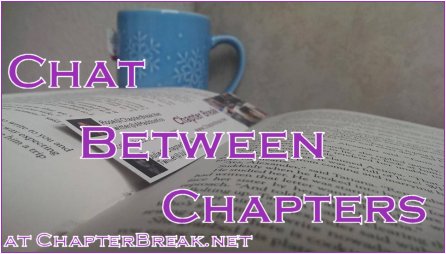
Does it bother you when a book contains historical inaccuracies or is it okay for an author to take literary license?
![]() Julie:
Julie:
I recently listened to Code Name Verity and the author had a note after the book where she admitted to changing a few facts to make her book flow better. I was kind of surprised she even brought it up, because those details were so minor. I don’t consider myself an expert on historical facts, and when I read a book of fiction I expect quite a bit of literary license to be taken. For the most part I don’t read too much historical fiction but instead focus on the fantastical books. So I don’t expect anything to be based in truth. But when I read a non-fantastical book, I do expect general laws of physics and overall well known facts to still apply. I do expect the author to do some research on a topic being written about, so that the story flows well and doesn’t sound completely fake. But I’m not getting upset if the little intricate details are missed or made up.
![]() Rose:
Rose:
I think it really depends. I mean if a book is good, it is good. I suppose some topics I am more interested in accuracy than other topics. For instance, I dislike books in which the author knows NOTHING about horses, but the main character has many interactions with them. Like, don’t write about a breed that didn’t exist during the middle ages. If I am fairly knowledgeable about a subject and the author gets sloppy or lazy with research, I feel like it takes away from the book. However, if I am not knowledgeable about the subject, I am not disheartened to discover that that particular model of automobile didn’t become available to the average consumer until three months after the author claims her protagonist was driving it. Fickle, I know.
![]() Lynn:
Lynn:
This is a fitting topic for me, as I just finished reading The Tournament by Matthew Reilly about Queen Elizabeth I (come back at the end of the week for my review!). The main characters are real, but the circumstances are not. With Google or Wikipedia a click away, it’s pretty easy to check the historical accuracy in books. But for me, I think fiction means fiction. I might research a person or event that interests me. But I don’t usually care enough to question the plot. I trust, probably naively, that a reasonable amount of research was conducted and that the major story arcs and character decisions are accurate.



This is a good question and a hard one to answer because I think we’re all a little fickle and have our pet peeves. I definitely have the least tolerance for literary license in biblical historical fiction, but even in other forms of historical fiction, I want the real events and characters to do what they really did. I’m okay with additions where we don’t know things, but I don’t really appreciate changes or inaccuracies. Of course, if I don’t know, then it can’t bother me! Thanks for sharing this at Booknificent Thursday!
Tina
Tina at Mommynificent recently posted…A Great Day at Booknificent Thursday Link Up Party #110
You’re right that if we know a lot about a topic, then the inaccuracies are extra bothersome. Thanks Tina!
Another great topic! I am guessing I am probably totally unaware when historical inaccuracies occur in fiction most of the time!
I actually hated history in school and thought I didn’t like historical fiction…until I started reading some for my book group. I was blown away by Geraldine Brooks’ March and discovered I DID like historical fiction!
If it’s fiction, then I assume some things are made up, and I’m fine with that.
Found your wonderful blog again this week through Painted Teacup link-up – I’m adding you to my list of blogs to follow!
Sue
Book By Book
Sue at Book By Book recently posted…The Big Book Clean-Out!
I’m with you, I assume fiction has a lot of fabrication. I also wasn’t a huge fan of history class in school. Thanks for stopping by! 🙂
This actually bothers me a lot. I know little about most historical periods, so I feel like if I can obviously see that something is not historically accurate, then the author should have been able to also to the same perfunctory Google search. I will allow some artistic license, but some “historical” novels are so far out of line with the period they are supposed to be from it drives me crazy. For example, when authors use modern names for their historical characters. Please at least do that much research if you plan to write a historical book! 🙂
Brenda @DailyMayo recently posted…Literary Junkies: Falling in Love with Books Again
Agree! If an author chooses to write a historical book, some research to the time period and expected language, names, etc should be done.
I like for an historical to *feel* accurate. I’m not going to take the time to look up whether or not something happened or didn’t and even if I know something about the time period, so I know when something is wrong, it probably wouldn’t bother me. What does nag at me in an historical is if the names don’t seem period, or words used in dialog aren’t accurate. It kind of ruins a story for me to have everything feeling right, say in a regency-era story, and then a character says “awesome”.
Bookworm Brandee recently posted…That’s What HE Said #35 ~ Thirsty Thursday & Hungry Hearts #14
Ooh what a great point – the language does have to sound appropriate for the period the story takes place in. Good call!
Oh yeah, language differences are terrible, too.
While it doesn’t really bother me if historical fiction veers from the facts, that’s probably because I don’t know much about the eras I’m reading. That being said, some readers WILL have knowledge about the era and will be frustrated by inaccuracies, so I think it makes a lot more sense for an author to stick to reality for the most part or put a disclaimer at the beginning or end. I HAVE read books with disclaimers at the end, and I actually really appreciate them – I kind of love knowing which things are real and which things were inspired by the author’s imagination!
Nicole @ Feed Your Fiction Addiction recently posted…Stepdog by Nicole Galland
It is neat knowing how much research went into a story, and what was pure imagination. Thanks Nicole 🙂
I guess with fiction I don’t expect everything to be accurate and to be honest I probably wouldn’t notice most inaccuracies unless they were huge or I knew a lot on the topic. But if the book is set in a historical setting I think I prefer the setting to be realistic, not something the author wrote about without doing any research at all.
Zareena @ The Slanted Bookshelf recently posted…ARC Review: This Is One Moment by Mila Gray
Agree, a historical setting does need some research. A fanastical one can be pure imagination 🙂
If it is a fiction book, I don’t care if it is historically accurate as long as it FEELS real. Since I read a lot of fantasy, I’m used to authors taking liberties.
I agree, it needs to feel like a story line that flows well, but doesn’t actually have to be factual.
Unless it is a nonfiction book, I expect the author to take a certain amount of innaccuracies. If it is a historical fiction novel, an author’s work may inspire me to do more research on the time period or events to see what is real and what isn’t. But does it bother me? Not at all.
Cynthia @ Bingeing On Books recently posted…Do You Reread?
Hey that’s cool that you might get inspired to do research into the topic of the historical fiction book.
I’m not bothered, but yes, I’d like a note of warning at the beginning of the book. The only danger to this is if people take what they read at face value and walk away with false information about historical, scientific, etc. facts, which they then share as true. But with a warning attached to the book, I’m good 🙂 In the end, a work of fiction is just that.
Ramona recently posted…Funny Grammar
I’ve never really paid attention, but do a lot of books come with that kind of disclaimer?
I agree with each one of you. Usually it doesn’t bother me unless I know a lot about subject. And you’ll often find me on Google or Wikipedia learning more about historical events to put the story into perspective especially if I don’t know much about a certain time period or country a story is set. I most recently did that while reading Grave Mercy.
Rose, I hear you about horses. 🙂 I really, really want to see an article about the staff who pick horses for the Games of Thornes series. They use such a wide variety of breeds that I’m curious to know what goes into the process of picking those breeds for a specific country in that realm. Sometimes I pay more attention to the horses in a show or movie than I do the actors.
Terri M., the Director recently posted…Scenic Sundays 45: Moving On and Danielle Steele
I think that is awesome that a fictional read will make you want to learn more and research it. The lazy me just doesn’t do that.
I’m more likely to do when I’m reading on my iPad mini than when I’m reading an physical book.
Terri M., the Director recently posted…Book Review 107: Ella, the Slayer by A.W. Exley